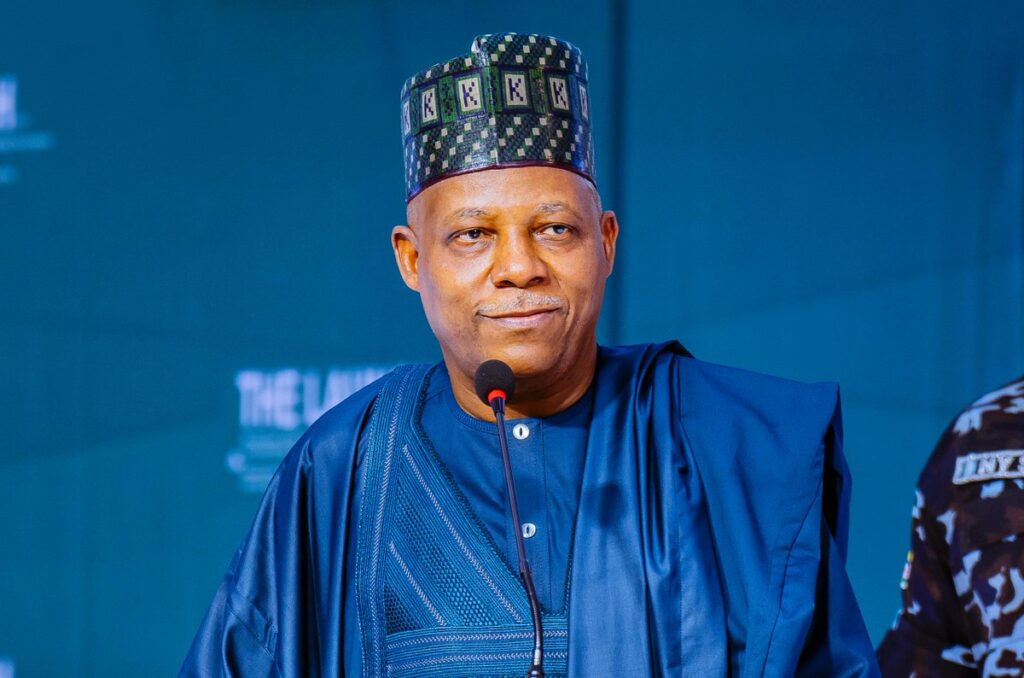Vice President Kashim Shettima has said the federal government would reverse the challenges of Nigeria’s growing informal sector and low labour force participation, which have been aggravated by the country’s high unemployment rate.
In a statement by his spokesperson, Stanley Nkwocha, Shettima emphasised that the Human Capital Development (HCD) Programme, spearheaded by President Bola Tinubu’s administration, is designed to address these societal issues.Shettima made these remarks last week during the launch of the Nasarawa State Human Capital Development Strategy Document and Gender Transformative Human Capital Development Policy Framework in Lafia, the state capital.
The Vice President stressed that the administration aims to equip Nigerians with globally competitive skills, positioning them to succeed both within the country and in the global labour market.

He stated: “Nasarawa State’s commitment to the Human Capital Development (HCD) Programme, a lifeline for our nation, is built on the collective realisation that enough is enough. Enough of the cycles that have held us back. Enough of the legacies of unplanned high fertility rates and alarming maternal and under-five mortality rates. Enough of our vulnerable populations facing low life expectancy.
“Enough of the distressing data on our education system—whether it is the mean years of schooling, the high pupil-to-teacher ratios, or the staggering number of youths not in employment, education, or training. The unemployment rates, the growing informal sector, and low labour force participation must be reversed.
READ ALSO:Shettima calls for return to core family values
“This is the dystopia our Human Capital Development Programme is designed to avert, under the mandate of His Excellency, President Bola Ahmed Tinubu. For so long, at the National Economic Council, we have debated the ideal nation we wish to build and the pathways to achieve it.”
Shettima noted that addressing the nation’s human capital challenges is central to the Human Capital Development (HCD) program, which prioritizes workforce development, education, and healthcare—key areas the Tinubu administration has been tackling at the national level.
He further highlighted that the unveiling of a strategic blueprint for Nasarawa State’s future underscores the administration’s shared conviction that the nation’s progress depends on crafting tailored solutions that align with the distinct realities of each state.
Shettima expressed his regret over the ECOWAS region’s unfortunate status as the lowest-ranked in the Global Human Capital Development Index. However, he assured that this situation should not be seen as irreversible.
READ ALSO: NNPC boss, Mele Kyari loses daughter, Tinubu, Shettima mourn
“Rather, it is an invitation for every country, and indeed sub-national entities, to rise to the challenge,” he added, pointing out emphatically that “every child must have access to quality education, equitable healthcare, even as the nation’s workforce must be equipped with the skills necessary to thrive in the 21st-century economy.”
The Vice President stressed the government’s commitment to equipping Nigerian youths with employable skills extends beyond achieving local success. He explained that the broader ambition is to empower them to “export these skills globally, competing at the highest levels in the international marketplace.”
“Our partnerships with the private sector are critical in achieving this. By facilitating access to resources, expertise, and innovation, we aim to make human capital development the cornerstone of a more prosperous and competitive Nigeria,” he added.
The Vice President attributed the launch of Nasarawa State’s strategy document and policy framework to the leadership and vision of Governor Abdullahi Sule, lauding it as a forward-thinking initiative that stands to make a significant impact.
READ ALSO: Shettima inaugurates National Road Safety Advisory Council
He announced that the federal government has advanced beyond the initial phase of the Human Capital Development (HCD) program by adopting strategies that align with current realities, transitioning from theory to actionable implementation.
He further highlighted that Nasarawa’s involvement at this critical juncture signifies promising progress.Earlier, Governor Sule expressed gratitude to stakeholders for their continued support of the HCD program, noting that the establishment of the Nasarawa State Investment and Development Agency is aimed at bolstering the state’s economy.

He emphasised that youth in Nasarawa would be productively engaged in sectors such as agriculture, health, and entrepreneurship while assuring that the state’s strategic document on HCD would be diligently implemented to guide interventions across various sectors.
Rukaiya El-Rufai, Special Adviser to the President on NEC and Climate Change, remarked that the National Human Capital Development program, unveiled in 2018, was designed to tackle poverty, drive socio-economic growth, and enhance human capital across Nigeria.
She also expressed her appreciation to Vice President Shettima for his leadership of the National Economic Council (NEC) and the HCD initiative.
Senator Ahmed Wadada, representing Nasarawa West constituency, commended Nasarawa State for being a trailblazer in laying the foundation for Human Capital Development in Nigeria.
He underscored the significance of investing in people, emphasizing that education is the bedrock of human development and must be accessible to all citizens.
Hajiya Habiba Suleiman, Director-General of the Nasarawa Human Capital Development Agency, noted that the HCD strategy document presented at the event outlines the state’s roadmap for advancing human capital development.
“Human Capital is the most valued asset any government can provide for its people,” she said.Earlier on arrival, the Vice President proceeded to the palace of the Emir of Lafia and Chairman of Nasarawa State Traditional Council, Justice Sidi Bage Muhammad I (rtd), where he paid homage to the royal father and commissioned a palace Museum named after the Shehu of Borno.


